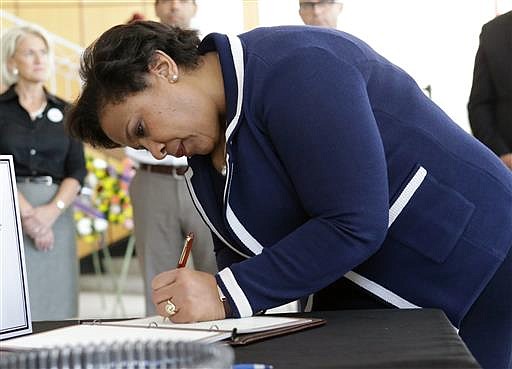ORLANDO, Fla. (AP) - Attorney General Loretta Lynch visited with relatives of victims in the Orlando massacre, told the gay community "we stand with you" and was briefed by law enforcement officials still trying to determine why the gunman targeted a popular gay nightclub.
Lynch's Justice Department and local police continue to investigate the June 12 attack at the Pulse nightclub, in which 49 people were killed and dozens more wounded. She called it a "shattering attack, on our nation, on our people and on our most fundamental ideals."
After conducting hundreds of interviews, federal investigators haven't ruled out charges against others in connection with the shooting and say they're still trying to determine what led Omar Mateen to carry out the carnage. He died in a gunbattle with police.
After what she called a "very difficult meeting" with victims' relatives, Lynch directly addressed the LGBT community, saying, "We stand with you to say that the good in the world far outweighs the evil and that our most effective response to terror and hatred is compassion, unity and love."
Her remarks at a news conference followed briefings by U.S. Attorney Lee Bentley and other law enforcement officials, including prosecutors assigned to the investigation.
"I think there's a real benefit to having her here to see everything firsthand," Bentley said as the two stood with their arms around each other.
Lynch said the Justice Department will provide Florida $1 million in emergency funds to help with response costs. Florida's Republican Gov. Rick Scott had earlier complained Washington had turned down his request for $5 million to help pay for the state's response.
Federal Emergency Management Agency spokesman Rafael Lemaitre said its disaster fund is not an "appropriate source" to pay for law enforcement response, medical care and counseling for victims resulting from a shooting.
More clues emerged about the attack Monday when the FBI released a partial transcript of phone calls Mateen had with a 911 operator and police crisis negotiators once the shooting got underway.
In them, he identified himself as an Islamic soldier, demanded that the U.S. "stop bombing" Syria and Iraq, warned of future violence in the coming days and at one point pledged allegiance to Abu Bakr al-Baghdadi, the leader of the Islamic State group, the FBI said.
Despite his declarations, the FBI said it's found no evidence the attack was directed by a foreign terrorist organization. Mateen instead appears to have become radicalized through reading online jihadist propaganda, an influence that openly worries law enforcement officials.
Mateen's calls to police, which one FBI official said were made in a "chilling, calm and deliberate manner" were similar to postings he apparently made to Facebook around the time of the shooting.

